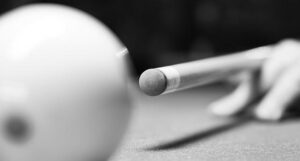MAINTAINING YOUR CUE TIP
 The pool cue tip is active in every one of your shots and is of utmost importance to have a good, clean tip at all times. Cleanliness affects backspin, accuracy, touch, smoothness of stroke, and the precision of each shot. When your pool cue is not in use it should be maintained by by protecting the cue’s tip from any damage it should be covered when not in play.
The pool cue tip is active in every one of your shots and is of utmost importance to have a good, clean tip at all times. Cleanliness affects backspin, accuracy, touch, smoothness of stroke, and the precision of each shot. When your pool cue is not in use it should be maintained by by protecting the cue’s tip from any damage it should be covered when not in play.
The spin/speed ratio on the cue ball depends primarily on the actual tip-ball contact point. You seldom want to hit the ball right in the middle, you don’t want to miscue, and you want to have precise control of the spin. Therefore, a rounded tip is better than a flat tip. Shape the tip with a tip scuffer, a file, a piece of 400-600 sandpaper, or other similar abrasive tools.
Miscues occur when the tip slides on the surface of the ball. Along with other reasons, this happens when the tip doesn’t hold chalk such as when it is packed down from hitting the cue ball and the surface is slick. If you tap the tip to give the surface some texture it will hold chalk better. You can buy special tools to tap the tip, or you can use a rasp, or a coarse file, or coarse sandpaper glued to a wood backing. Simply roll it over the tip surface. Scuffing with sandpaper also works, but it wears the tip away too fast. For maximal tip life, tap more, scuff less.
Tips can also mushroom, meaning that the leather bulges at the sides so that the tip is wider than the ferrule. Most pool players prefer to remove this bulge. The best way is to use a lathe, but there are other methods too. Fine sandpaper (600 grit or finer) can be used, but care should be taken not to scratch the ferrule. Cutting tools designed especially for this purpose are available, and pocket knives and razor blades can also be used, but again, avoid ferrule damage. After the mushroom bulge has been removed, the edge of the tip can be polished by wetting the sides and rubbing the leather edge firmly against the cloth on the top of a cushion or against a leather pad.
It is also important to maintain the ferrule. Over time, chalk, dirt, and other foriegn substances can build up on the ferrule and embed on your pool cue like a tar substance. Cleaning the ferrule and tip regularly by wiping it down can help to prevent this buildup from occurring (be sure that you dry it well). This makes for a smoother, cleaner, and better playing shaft, which can only serve to improve your game, and extend the usability of your pool cue.
You might be interested in this post on the “break”
